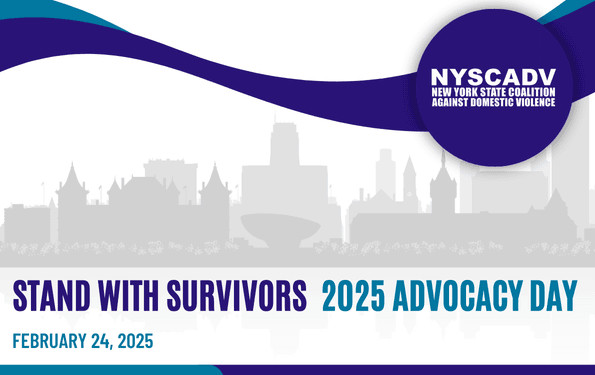We will be convening at the NYS Capitol in Albany for a morning program in the Well of the Legislative Office Building, followed by meetings with legislators throughout the afternoon.
During the event, we will tell our stories, share our struggles to serve survivors, and advocate for budget and policy initiatives that will ensure the continuity and sustainability of DV services. With potential changes at the federal level, it’s more important than ever that the voices of DV advocates and survivors are represented and heard.
If you can’t join us, no problem. Uplift our Advocacy Day messaging on social media and with legislators through emails, phone calls and virtual meetings.
Our 2025 budget requests include:
- Creating a $200 million DV Services Transformation and Stabilization Program to systemically change New York’s method of funding DV programs into a more innovative, sustainable, trauma-informed and survivor-centered system;
- Increase the Governor’s $100 million earmark for victim services to $150 million;
- Stabilize the DV sector’s diminishing workforce and infrastructure by providing a 7.8% increase on all State contracts with DV providers;
- Increase the TANF set aside for non-residential DV services to $9.6 million to meet demand and account for inflation increases over the last 25 years.
Identify who your representative is and find their contact page or email.
You can do that by visiting the following links:
Additional Resources
-
Tips for Effective Lobbying
-
NYSCADV hosted an informational webinar on Wednesday, February 12 to review the Governor’s Executive Budget, NYSCADV’s budget & legislative priorities and basic lobbying tips to help you prepare for your legislative visits.
This link will navigate to NYSCADV's Coalition Manager website. You must use your Coalition Manager login information to access the resources. All staff of primary-purpose domestic violence programs in New York State are eligible for a Coalition Manager account. Please contact your supervisor or program administrator to set up a coalition manager account. If you need additional assistance, please complete a CM Support Ticket, by visiting this weblink: https://nyscadv.coalitionmanager.org/formmanager/formsubmission/create?formId=1175









